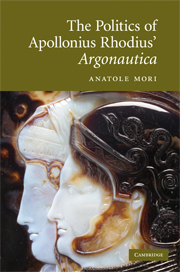Book contents
- Frontmatter
- Contents
- List of tables
- Acknowledgments
- List of abbreviations
- 1 Introduction
- 2 The politics of Alexandrian poetry
- 3 Strife and restraint among the Argonauts
- 4 Sexual politics in Lemnos, Colchis, and Drepane
- 5 Piety, mediation, and the favor of the gods
- 6 The bones of Apsyrtus
- 7 Quid denique restat: Apollonius and Virgil
- Bibliography
- Index
7 - Quid denique restat: Apollonius and Virgil
Published online by Cambridge University Press: 22 September 2009
- Frontmatter
- Contents
- List of tables
- Acknowledgments
- List of abbreviations
- 1 Introduction
- 2 The politics of Alexandrian poetry
- 3 Strife and restraint among the Argonauts
- 4 Sexual politics in Lemnos, Colchis, and Drepane
- 5 Piety, mediation, and the favor of the gods
- 6 The bones of Apsyrtus
- 7 Quid denique restat: Apollonius and Virgil
- Bibliography
- Index
Summary
Intimations of the Aeneid
In 30 BC during his first and only trip to Alexandria, Octavian is said to have viewed Alexander's sarcophagus, though he scorned an invitation to visit the tombs of the Ptolemies: “I wished to see a king, not corpses.” He is also said to have refused, in rather un-Alexander-like fashion, to enter the presence of the Apis bull, saying that he was accustomed to worshipping gods, not cattle. Though he was initiated into the mysteries at Eleusis and generally represented himself as respectful of foreign divinities, Octavian seems to have made an exception in the case of Egypt, a land where, as he observed in an earlier speech, they honor reptiles and other wild beasts as gods.
Octavian's rejection of the Egyptian gods was as politically calculated, of course, as Alexander's generous appreciation had been. As his visit to Alexander's tomb suggests, his quarrel was not with the ancient glories of Ptolemaic rule, but rather with the most recent incarnations of Isis and Dionysus, and he was doing what he could to erode these bonds as well. On the night before Antony committed suicide, while Octavian's legions were camped outside Alexandria, Dionysus was rumored to have abandoned the city with a retinue of Bacchic dancers and musicians (Plut. Ant. 75.4–6).
- Type
- Chapter
- Information
- The Politics of Apollonius Rhodius' Argonautica , pp. 224 - 235Publisher: Cambridge University PressPrint publication year: 2008



